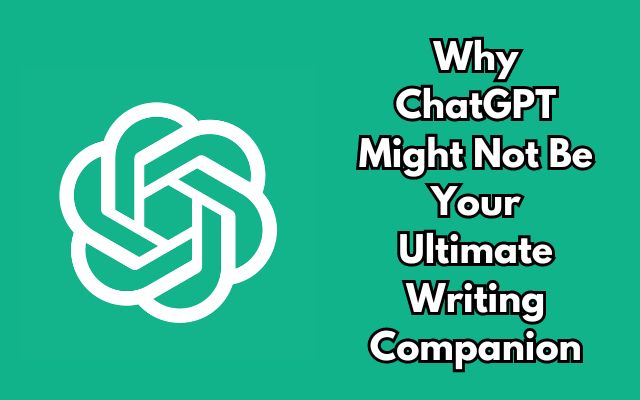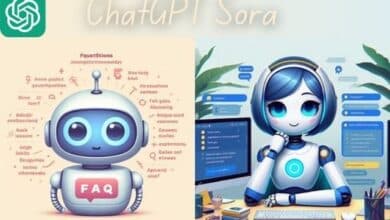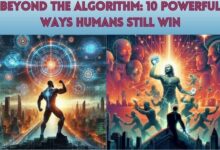Why ChatGPT Might Not Be Your Ultimate Writing Companion
“Explore why ChatGPT might not be your ultimate writing companion. Understand its benefits, limitations, and the balance between AI and human input.”

Why ChatGPT Might Not Be Your Ultimate Writing Companion is a question that has been gaining traction in the digital world. As we delve into the era of artificial intelligence, tools like ChatGPT are becoming increasingly popular. They promise efficiency, accuracy, and the ability to generate human-like text. But is it all as rosy as it seems?
This article aims to shed light on the less-discussed aspects of using AI for writing. While ChatGPT can be a powerful tool, it may not always be the best fit for everyone’s writing needs. We will explore the reasons behind this, providing a balanced view of the capabilities and limitations of ChatGPT. So, let’s embark on this journey to understand why ChatGPT might not be your ultimate writing companion.
Understanding ChatGPT
ChatGPT, developed by OpenAI, is a powerful AI tool that has revolutionized the field of text generation. It’s built on a family of Large Language Models (LLMs), collectively known as GPT-3. As of February 2024, OpenAI has introduced its next-gen GPT-4 models, which can understand and generate human-like responses to text prompts.
One of the significant updates to ChatGPT is its ability to remember things discussed across all chats. This feature, tested in February 2024, saves users from having to repeat information and makes future conversations more helpful. Users are in control of ChatGPT’s memory and can explicitly tell it to remember or forget something.
In addition to memory, another transformative ability of ChatGPT is its capacity to browse the internet. This feature, introduced in late 2023, allows ChatGPT to provide users with the latest, up-to-the-minute information. This marks a significant release from its previous limitation of offering information only up until September 2021.
Despite these advancements, it’s important to note that ChatGPT is not without its limitations. While it can generate plausible-sounding responses, it sometimes produces incorrect or nonsensical answers. It’s also sensitive to tweaks in the input phrasing. For instance, given one phrasing of a question, the model can claim to not know the answer, but given a slight rephrase, it can answer correctly.
Now, we will delve deeper into the benefits and drawbacks of using ChatGPT for writing. This will help us understand why ChatGPT might not be your ultimate writing companion…
The Appeal of ChatGPT
ChatGPT, a product of OpenAI, has become a game-changer in the realm of text generation. Its ability to mimic human-like conversation has made it a popular tool across various industries. From marketers and programmers to educators and researchers, many professionals have found value in using ChatGPT to enhance their work.
One of the key advantages of ChatGPT is its ability to automate repetitive tasks. By handling these tasks, it allows users to focus on more complex and creative aspects of their work. Furthermore, ChatGPT’s ability to provide fast, accurate, and personalized responses to customer queries has made it a valuable tool in improving customer engagement.
Another significant benefit of ChatGPT is its capacity to learn from every query that it receives. This continuous learning enables ChatGPT to provide more accurate and relevant responses over time. As a result, it can offer a level of customer service that is often superior to traditional chatbots.
Moreover, ChatGPT’s ability to generate content that is comprehensive and plausibly accurate has been lauded by many. It can assist with a wide range of tasks, from writing software and creating 3D models to providing relationship advice and explaining complex concepts.
However, while these benefits are impressive, it’s important to remember that ChatGPT is not without its limitations. In the next section, we will explore some of the challenges and drawbacks associated with using ChatGPT for writing. This will help us understand why, despite its many advantages, ChatGPT might not be your ultimate writing companion.
The Limitations of ChatGPT
While ChatGPT has made significant strides in the realm of text generation, it’s important to acknowledge its limitations. One of the most significant challenges is its lack of creativity when it comes to creating unique content. AI tools like ChatGPT are great for generating text that is data-driven but often struggle with producing creative, human-like content.
Another limitation is the sensitivity of ChatGPT to tweaks in the input phrasing. Given one phrasing of a question, the model can claim to not know the answer, but given a slight rephrase, it can answer correctly. This inconsistency can lead to confusion and frustration for users.
Furthermore, AI-generated text may lack the nuance and emotional intelligence that human expression brings. It can sometimes produce inaccurate or biased information, as it relies on existing data and patterns. Therefore, it’s crucial to strike a balance between AI-generated text and human input to ensure the best possible outcome.
Despite these limitations, ChatGPT and similar AI tools have a lot to offer. They can automate repetitive tasks, provide fast and accurate responses, and learn from every query they receive. However, it’s essential to understand these tools’ limitations and use them in a way that maximizes their benefits while mitigating their drawbacks.
Now, we will explore how to balance AI and human input in writing. This will help us understand why, despite its many advantages, ChatGPT might not be your ultimate writing companion.
Balancing AI and Human Input in Writing
In the world of content creation, finding the right balance between AI and human writing is crucial. While AI tools like ChatGPT can automate repetitive tasks and provide fast, accurate responses, they often lack the creativity, nuance, and emotional intelligence that human expression brings.
AI-generated text is data-driven and can sometimes produce inaccurate or biased information, as it relies on existing data and patterns. Therefore, it’s essential to strike a balance between AI-generated text and human input to ensure the best possible outcome.
One way to achieve this balance is to use AI writing tools for repetitive or mundane tasks, such as data analysis, keyword research, and content distribution. This frees up time for human writers, allowing them to focus on producing high-quality content that delivers value to readers.
Human writers bring their narratives, anecdotes, and emotions to their work, enriching blog posts with authenticity and depth. They can craft blog posts that mesmerize readers and establish an enduring influence by maximizing their creativity.
The perfect blend of an AI text generator and human writing is what the industry needs to create unique, creative, and data-driven content. By leveraging the strengths of both AI and human writers, we can create content that is factually accurate, emotionally resonant, and captivating to readers.
AI tools like ChatGPT have a lot to offer, they are not without their limitations. Understanding these limitations and using these tools in a way that maximizes their benefits while mitigating their drawbacks is key to finding the right balance between AI and human input in writing.
FAQ
What is ChatGPT?
ChatGPT is a powerful AI tool developed by OpenAI that has revolutionized the field of text generation. It’s built on a family of Large Language Models (LLMs), collectively known as GPT-3.
What are the benefits of using ChatGPT?
ChatGPT can automate repetitive tasks, provide fast, accurate responses, and learn from every query it receives. It can assist with a wide range of tasks, from writing software and creating 3D models to providing relationship advice and explaining complex concepts.
What are the limitations of ChatGPT?
ChatGPT often lacks the creativity, nuance, and emotional intelligence that human expression brings. It can sometimes produce inaccurate or biased information, as it relies on existing data and patterns.
How can we balance AI and human input in writing?
It’s essential to strike a balance between AI-generated text and human input to ensure the best possible outcome. One way to achieve this balance is to use AI writing tools for repetitive or mundane tasks, such as data analysis, keyword research, and content distribution. This frees up time for human writers, allowing them to focus on producing high-quality content that delivers value to readers.
Why might ChatGPT not be your ultimate writing companion?
While ChatGPT can be a powerful tool in your writing arsenal, it might not be your ultimate writing companion because it’s a tool, not a replacement for human creativity and insight. Use it wisely, and it can help you achieve your writing goals.
- What is ChatGPT Sora and How Does It Work?
- Why Google Believes Gemini Beats ChatGPT
- Beyond the Algorithm: 10 Powerful Ways Humans Still Win
Conclusion: Why ChatGPT Might Not Be Your Ultimate Writing Companion
While AI tools like ChatGPT have revolutionized the field of text generation, they are not without their limitations. They can automate repetitive tasks and provide fast, accurate responses, but often lack the creativity, nuance, and emotional intelligence that human expression brings.
Understanding these limitations and using these tools in a way that maximizes their benefits while mitigating their drawbacks is key to finding the right balance between AI and human input in writing. By leveraging the strengths of both AI and human writers, we can create content that is factually accurate, emotionally resonant, and captivating to readers.
So, while ChatGPT can be a powerful tool in your writing arsenal, it might not be your ultimate writing companion. It’s a tool, not a replacement for human creativity and insight. Use it wisely, and it can help you achieve your writing goals.






